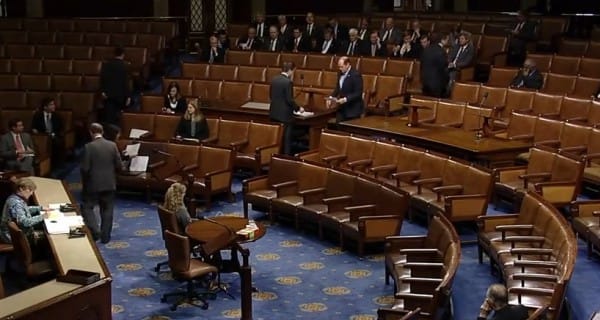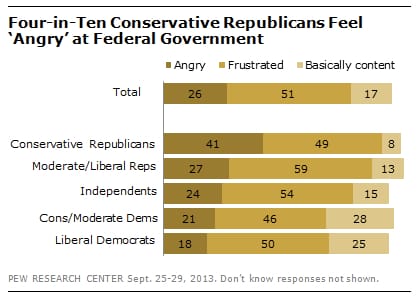77 Percent Frustrated, Angry By Dysfunctional Government

Floor of the House of Representatives // Credit: boxden.com

Pew Research released a poll Monday after surveying 1,005 voting-age adults in anticipation of the October 1 deadline for Congress to pass a budget bill and avoid a partial government shutdown. In the midst of another legislative stalemate in Washington, voters are the most frustrated in years.
Since Pew started asking the question in 1997, the percent of Americans who report being either 'frustrated' or 'angry' reached its highest level, 86 percent, in 2011. Today, 77 percent describe themselves as such. Up about 7 percent from January.
However, this anger is not spread evenly among Republicans, Democrats and independents. Pew found:
"As in the past, substantial majorities across the political spectrum are either angry or frustrated with the federal government. But anger at the government is far more widespread among conservative Republicans than other partisan groups. This marks a change from 2011, when political independents (30% angry) were about as likely as conservative Republicans (32%) to express anger at the federal government. In the new survey, 41% of conservative Republicans say they feel angry at the government, compared with 27% of independents." Source: Pew Research

The poll reported a heightened awareness among the electorate regarding the possibility of a government shutdown as a result of failed budget talks. Sixty-one percent of voters reported following the story 'very or fairly closely,' with 40 percent following the talks 'not too or not at all closely.'
The voting bloc that reported not following the news closely were voters age 18-29, 63 percent. Conversely, voters over 65 were the most engaged at 82 percent. Overwhelmingly, older voters seem to be following the news about the shutdown debate 'very or fairly closely.'
When Pew examined what voters cited as the cause for dysfunction in Washington, 52 percent of independent voters responded "political parties have grown so far apart that they can’t agree on solutions" and 32 percent felt it was due to a minority of members in Congress who refused to compromise.
Respondents identifying themselves as Republicans and Democrats were on opposite ends of the spectrum when asked what was the main reason for Congress not getting things done. The majority of Democratic respondents -- 52 percent -- felt a minority of Congress members were preventing compromise, whereas an overwhelming majority of Republicans -- 62 percent -- described the parties as being too far apart ideologically.
The public is split over whether growing divisions in Washington reflect an increasingly divided society. About four-in-ten (44%) say growing political divisions are mostly among elected officials and not American society more broadly. A comparable percentage (41%) says these divisions among elected officials reflect a more divided American society. Both Democrats and Republicans are split as to whether the partisan division in Washington does or does not reflect a more divided society.


